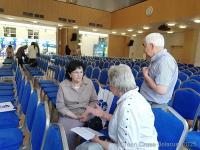GCB representatives discussed environmental issues at the BRICS forum in Moscow

Vladimir Shevtsov, director of the Green Cross Belarus, and coordinator Natalia Sviatkina took part in the International Forum "BRICS Countries: Environmental Aspects of Development and Cooperation" held in Moscow on 5-6 June 2025.
The Forum was timed to coincide with World Environment Day and brought together environmentalists, scientists, specialists and members of the public with significant experience in studying and solving environmental problems.
The forum raised a wide range of issues related to the interests of the countries and prospects for cooperation in the field of ecology, the role of education, science and culture in the environmental development of the BRICS countries. The participants presented their research, discoveries and experience in the field of renewable energy use, greenhouse gas emission reduction, waste recycling, addressing climate change, deforestation, desertification, biodiversity reduction, as well as health conservation in the context of fresh water scarcity and the need to promote organic farming.
The presentations of GCB representatives focused on the importance of public involvement in ecological research processes and the role of the school in popularising ecological approaches. Natalia Sviatkina presented a network study on invasive insect species, initiated this year jointly with the National Research Centre for Bioresources of the National Academy of Sciences of Belarus. Its goal is to clarify the extent of distribution and harmfulness of invasive insect species in Belarus and in the border areas, as well as to raise awareness of the problem of invasive species among residents of all ages.
Vladimir Shevtsov presented the experience of the project "School Garden" as an example of practical popularisation of organic agriculture and people's diplomacy (the project united Belarus, Moldova, Russia and Azerbaijan), as well as the experience of development and application of educational aids on protected areas, in particular on the Polessie State Radiation-Ecological Reserve, which can be considered a unique scientific and practical laboratory for studying issues of ecosystem restoration. A special attention in his report was paid to Civil Science - involvement of citizens in scientific research as a method of forming collective responsibility for the ongoing processes, including in the field of ecology.
Information about the 20-year project "In My Homeland", which this year brought together works from 17 countries, was an example of broad international co-operation.
The presented research and experience will certainly be used in the country and international environmental development strategies of the BRICS+ countries, and will probably give impetus to new initiatives in the field of environmental protection.
